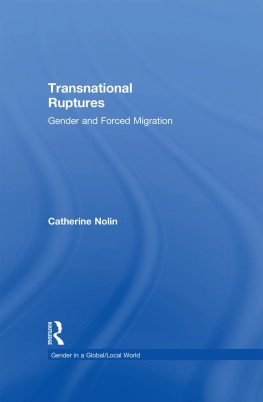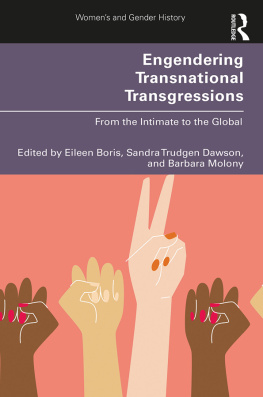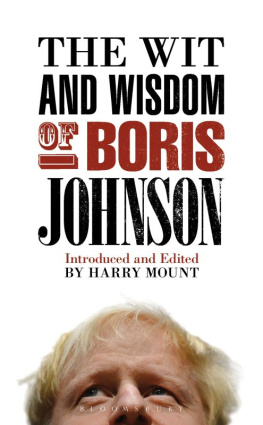Theorising Transnational Migration
Routledge Research in Transnationalism
1 New Transnational Social Spaces
International Migration and Transnational Companies in the Early 21st Century
Edited by Ludger Pries
2 Transnational Muslim Politics
Reimagining the Umma
Peter G. Mandaville
3 New Approaches to Migration?
Transnational Communities and the Transformation of Home
Edited by Nadje Al-Ali and Khalid Koser
4 Work and Migration
Life and Livelihoods in a Globalizing World
Edited by Ninna Nyberg Sorensen and Karen Fog Olwig
5 Communities across Borders
New Immigrants and Transnational Cultures
Edited by Paul Kennedy and Victor Roudometof
6 Transnational Spaces
Edited by Peter Jackson, Phil Crang and Claire Dwyer
7 The Media of Diaspora
Edited by Karim H. Karim
8 Transnational Politics
Turks and Kurds in Germany
Eva stergaard-Nielsen
9 Culture and Economy in the Indian Diaspora
Edited by Bhikhu Parekh, Gurharpal Singh and Steven Vertovec
10 International Migration and the Globalization of Domestic Politics
Edited by Rey Koslowski
11 Gender in Transnationalism
Home, Longing and Belonging among Moroccan Migrant Women
Ruba Salih
12 State/Nation/Transnation
Perspectives on Transnationalism in the Asia-Pacific
Edited by Brenda S. A. Yeohand Katie Willis
13 Transnational Activism in Asia
Problems of Power and Democracy
Edited by Nicola Piper and Anders Uhlin
14 Diaspora, Identity and Religion
New Directions in Theory and Research
Edited by Waltraud Kokot, Khachig Tllyan
and Carolin Alfonso
15 Cross-Border Governance in the European Union
Edited by Olivier Thomas Kramsch and Barbara Hooper
16 Transnational Connections and the Arab Gulf
Edited by Madawi Al-Rasheed
17 Central Asia and the Caucasus
Transnationalism and Diaspora
Edited by Touraj Atabaki and Sanjyot Mehendale
18 International Migration and Security
Opportunities and Challenges
Edited by Elspeth Guild and Joanne van Selm
19 Transnational European Union
Towards a Common Political Space
Edited by Wolfram Kaiser with Peter Starie
20 Geopolitics of European Union Enlargement
The Fortress Empire
Edited by Warwick Armstrong and James Anderson
21 Rethinking Transnationalism
The Meso-link of Organisations
Edited by Ludger Pries
22 Theorising Transnational Migration
The Status Paradox of Migration
Boris Nieswand
First published 2011
by Routledge
711 Third Avenue, New York, NY 10017
Simultaneously published in the UK
by Routledge
2 Park Square, Milton Park, Abingdon, Oxon OX14 4RN
Routledge is an imprint of the Taylor & Francis Group,
an informa business
2011 Boris Nieswand
The right of Boris Nieswand to be identified as author of this work has been asserted in accordance with sections 77 and 78 of the Copyright, Designs and Patents Act 1988.
Typeset in Sabon by IBT Global.
Printed and bound in the United States of America on acid-free paper by IBT Global.
All rights reserved. No part of this book may be reprinted or reproduced or utilised in any form or by any electronic, mechanical, or other means, now known or hereafter invented, including photocopying and recording, or in any information storage or retrieval system, without permission in writing from the publishers.
Trademark Notice: Product or corporate names may be trademarks or registered trademarks, and are used only for identification and explanation without intent to infringe.
Library of Congress Cataloging-in-Publication Data
Nieswand, Boris.
Theorising transnational migration : the status paradox of migration / by
Boris Nieswand.
p. cm. (Routledge research in transnationalism ; 22)
Includes bibliographical references and index.
1. ImmigrantsCultural assimilation. 2. ImmigrantsSocial conditions. 3. Transnationalism. 4. Emigration and immigrationSocial aspects. I. Title.
JV6342.N54 2011
304.8dc22
2010053378
ISBN13: 978-0-415-58455-5 (hbk)
ISBN13: 978-0-203-81043-9 (ebk)
Acknowledgments
First, I would like to express my special gratitude to Gnther Schlee, who had the initial project idea and supervised the Ph.D. thesis out of which this book has developed. The department of Integration and Conflict at the Max Planck Institute for Social Anthropology in Halle provided a vibrant intellectual environment for my work. Moreover, I would like to thank Nina Glick Schiller, Stephen Reyna, Steven Vertovec, Richard Rottenburg, Dereje Feyissa, Jrn Eichler, Andrea Riester, Olaf Zenker, Markus Hhne, Christiane Falge and Heike Drotbohm for their intellectual contributions, their help and their encouragement. Without them and their inspiration this book would not be the same. Moreover, I feel deeply indebted to the generosity and kindness of my Ghanaian informants and friends, who gave me insight into their lives and helped me to conduct my research in Ghana and Germany. Among many who supported my work I would like to single out Isaac Appiah Kubi, Victor Boadum, Gideon Alabami Kayar and Stephen Kofi Owusu, who contributed most substantively to the success of this study.
Furthermore, I would like to acknowledge the institutions that have supported my doctoral thesis. First of all, I want to thank the Max Planck Society and the Max Planck Institute for Social Anthropology in Halle/Saale for their generous financial and logistical support of my research. In addition, I would like to thank the Graduate School Asia and Africa in World Reference Systems at the Martin Luther University Halle-Wittenberg for providing me with a six-month writing-up scholarship and the Max Planck Institute for the Study of Religious and Ethnic Diversity which supported me in reworking my Ph.D. thesis into a book. In this context, special thanks go to Astrid Finke, Jutta Turner, Christiane Kofri, Fanny Hocker, Birgitt Sippel and Diana Aurisch, who helped me edit the manuscript at different stages of the work.
And last but not least, I want to thank my daughter Judith and my family for helping me to keep one foot on the ground.






